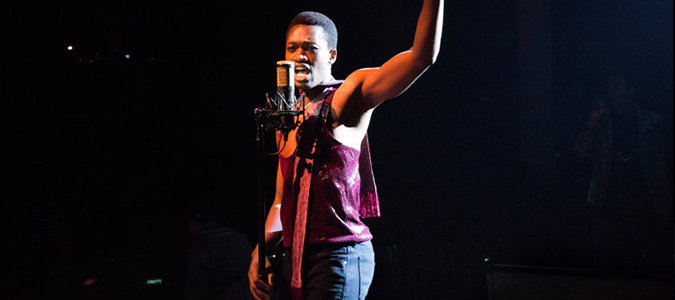

The Total Bent
Opening Night: May 25, 2016
Closing: June 12, 2016
Theater: The Public Theater
Stew and Heidi Rodewald, creators of the Tony Award-winning show Passing Strange, team with director Joanna Settle to bring you their thrilling new musical, THE TOTAL BENT, a riotous new show at the crossroads of the sacred and profane, survival and liberation, gospel and rock ‘n’ roll. When a British record producer arrives in Montgomery, Alabama to hook Marty Roy, a young black musical prodigy, he launches us back into Marty’s tumultuous upbringing. The son of a gospel star and self-proclaimed healer, Marty spent his childhood writing the songs that have made his charismatic father famous. But in a nation on the verge of social upheaval, with the rising heat from the street guiding his pen, Marty finds himself at odds with his spiritually forceful father as he strives to create a masterpiece that will change America— no matter the cost. A funny, fiery, one-of-a-kind show, THE TOTAL BENT is about the passions that divide a father and son as they make their music and make their choice between salvation and selling out. THE TOTAL BENT features Marty Beller (Drums, Musical Direction); Ato Blankson-Wood (Marty Roy); John Blevins (Trumpet); Kenny Brawner (Deacon Charlie); David Cale (Byron Blackwell); Vondie Curtis Hall (Joe Roy); Damian Lemar Hudson (Deacon Dennis); Jahi Kearse (Andrew); Brad Mulholland (Saxophone); Heidi Rodewald (Bass); Stew (Guitar);and Curtis Wiley (Abee). THE TOTAL BENT is made possible with the generous support of STEVE KLEIN and WILLIAM KOHANE.
BUY TICKETSREAD THE REVIEWS:
May 25, 2016
What a difference eight years can make. When it blasted onto Broadway in 2008, songwriting team Stew and Heidi Rodewald’s concept-albumy Passing Strange flew its freak flag high and proud. The coming-of-age funk-rock musical felt extra fresh in a theatrical landscape that had variety, if not a ton of diversity. Now the team has a new project, which may or may not get to Broadway, but that hardly matters. With game-changing hits such as Hamilton and Fun Home thriving, the uptown scene has become a lot more inclusive and eclectic; perhaps Passing Strange had a hand in that evolution. All three titles I mention started life at the Public Theater, a fact quite relevant. The Total Bent is a daring and overreaching sophomore musical, one that most commercial producers (or even nonprofits) would hesitate to bankroll. It’s a shaggy, idiosyncratic patchwork of Civil Rights–era satire, father-son drama and an allegory about the birth of funk. As with Passing Strange, Stew (who wrote the book and lyrics and collaborated with Rodewald on the music) is fascinated by heroes who self–re-create, burn out or, preferably, both. Here, rebellious, bisexual songwriter Marty Roy (red-hot Ato Blankson-Wood) must break away from his cynical, gospel-singing father, Joe Roy (Vondie Curtis Hall, sweating charisma and sex appeal). The loose historical frame is MLK’s 1960s, in a town called “Bluntgomery, Alabama.” Marty wants to protest in the streets, but his father would rather offer the masses soul-music bread and circus. Enter Byron Blackwell (John Cale), a blues-besotted Englishman who wants to produce a record with Marty, then shifts his industry affections to the papa. Betrayed in the studio (and, we suspect, the bedroom), Marty reinvents himself, taking the stage for a miniconcert that blends glam-rock flamboyance and fire-and-brimstone Christianity. Church and mosh pit become one. Director Joanna Settle’s great achievement is crafting a physical production that looks like it sprang organically from a jam session. Stew, Rodewald and the rest of the band sprawl around the back of the space (decked out in cozy-kitschy plaid patterns by designer Andrew Lieberman), taking roles and lines to push the plot along. Stew occupies much less of the spotlight than he did in Passing Strange, which puts the onus on his storytelling skills. So it does help to be a Stew fan going into Total Bent, which at close to two intermission-free hours has its repetitive and dull stretches. However, the music is funky, fierce and sticky-sweet, and you might get burned from the heat coming off the performers. And you will be trying choreographer David Neumann’s boogie slides at home with the door shut. In short: Never felt the spirit move in you? Heathen, get churched.—David Cote
READ THE REVIEWMay 25, 2016
A singing preacher and his singing son go mano-a-mano, or rather microphone-to-microphone, in “The Total Bent,” a blazingly entertaining new musical set mostly during the 1960s from the creators of “Passing Strange,” Stew and his regular collaborator Heidi Rodewald. The novelty here is that Stew himself is not center stage, as he was in that loosely autobiographical show, which started at the Public Theater before moving to Broadway. He’s onstage, to be sure — and once again at the Public — singing, playing guitar and piano, and chiming in with a line or two of dialogue. Ms. Rodewald is also present, mostly seated on a couch playing bass and adding vocals. But there’s hardly a void at the center of this fresh and funny if sometimes wayward show, with a text by Stew and music by Stew and Ms. Rodewald. Quite the contrary. Playing the preacher is the vibrant Vondie Curtis Hall, who seems to shine with a righteous light when he sings. And as his son, Ato Blankson-Wood gives a breakout performance of wry wit and musical intensity. Portraying a gay young man who moves from composing songs for his father to composing them for himself, he transforms before our eyes from a rebellious boy fiddling with a recording console into a live-wire performer, half Tina Turner, half Mick Jagger and all strutting bravado and androgynous sex appeal. (There’s even a sly allusion to Ms. Turner’s spoken introduction to her fiery version of “Proud Mary.”) The story of Joe Roy (Mr. Hall) and his son, Marty, (Mr. Blankson-Wood) begins as Marty is urging Joe to resurrect his career by recording a protest album, to get on board with the civil rights movement that is roiling the South, and specifically Montgomery, Ala., where they live and where a bus boycott is underway. (The city is referred to throughout at “Bluntgomery.”) Joe’s thriving career as an itinerant preacher and singer of gospel hits composed by Marty fell apart when he attempted an unwise foray into faith healing, and he desperately needs a comeback. But he’s none too pleased with the song that opens the show — although you would hardly know it from Mr. Hall’s mesmerizing performance. Marty’s latest includes a chorus celebrating the mercy of Jesus, with the repeated refrain, “That’s why he’s Jesus and you’re not, whitey.” Their angry sparring over the song becomes personal, as Joe shares with the audience his contempt for a son who wore his mother’s high heels as a boy (“She loved that,” Marty interjects) and had “an unhealthy obsession with Danny Kaye movies.” Also: He hated all sports — except tennis. But Joe’s dim view of his son’s character is matched by Marty’s anger at his father’s reactionary attitudes, which Joe expresses in a song featuring a chorus admonishing the local agitators to “shut up and get back on the bus” and “suffer your oppression with a smile.” (“Which one y’all wrote this?” Marty angrily demands of the onstage band as Joe sings.) Their opposed worldviews eventually lead to a rift — although this is glossed over a little abruptly. Joe continues to preach accommodation, making a television appearance to calm the waters. Meanwhile, Marty turns a couple of fellows sneaking into the recording studio into his backup singers and dancers, and begins recording himself. (Jahi Kearse and Curtis Wiley give lively performances in these fairly substantial roles.) Helping him make the transformation is Byron Blackwell (a marvelously oily David Cale), a British man obsessed with black music who styles himself as a producer and also, it is implied, becomes Marty’s lover. At the same time, he attempts to cajole Joe, whom he also considers a musical genius, into recording for him, causing friction on all sides. “The Total Bent” can get a little fuzzy when it comes to the details of its story. Stew’s book is not always cogent, although it’s consistently funny. But then the show as a whole, directed by Joanna Settle, has an intentionally loose vibe, with the band interacting with the characters (and occasionally even singing their lines) and the characters at times talking to the audience as much as to one another. The set, by Andrew Lieberman, echoes the casual attitude, featuring garish-mod carpeting and a jumble of period furniture, as well as a church pew. Even if you may scratch your head at a few points — half the characters have some sort of mystical conversion experience, though what they are converting to or from is unclear — “The Total Bent” keeps you hooked through the surging power of its sensational score, which blends elements of the blues, gospel, funk and throbbing guitar-driven rock. Stew’s lyrics, too, are a consistent pleasure. One particularly pointed song finds a mystified Byron asking, as the song is titled, “Why Do Black People Still Believe in God?” Pointing out the history of African-Americans’ oppression, he’s backed up by Marty, but opposed by other members of the cast, notably Deacon Charlie (a dignified Kenny Brawner), who sing, “Hell ain’t so bad when you know you goin’ to heaven.” “The Total Bent” — the title comes from a speech by the Rev. Dr. Martin Luther King Jr. and is the name of Marty’s breakthrough album — becomes bogged down when it comes to the character of Marty himself. Is he, in the end, a real believer? It’s hard to tell. But Mr. Hall and Mr. Blankson-Wood give such galvanizing performances, as equally stubborn men who cannot seem to free themselves from each other’s emotional orbit, that the nagging questions — like what exactly happened to Marty’s mother, or why does Marty end up in jail at one point? — are easy to forget. Mr. Hall sings with a seductive purr that can rise to soaring, soulful heights. And Mr. Blankson-Wood delivers a reflective ballad with silken authority, but also rips into the slashing up-tempo songs with a flair that recalls any number of great black R&B stars. When either performer is pouring himself into one of the heat-generating songs, you may forget you’re watching a musical at all. At its best, “The Total Bent” feels more like an ecstatic combination of revival meeting and rock concert.
READ THE REVIEW




















